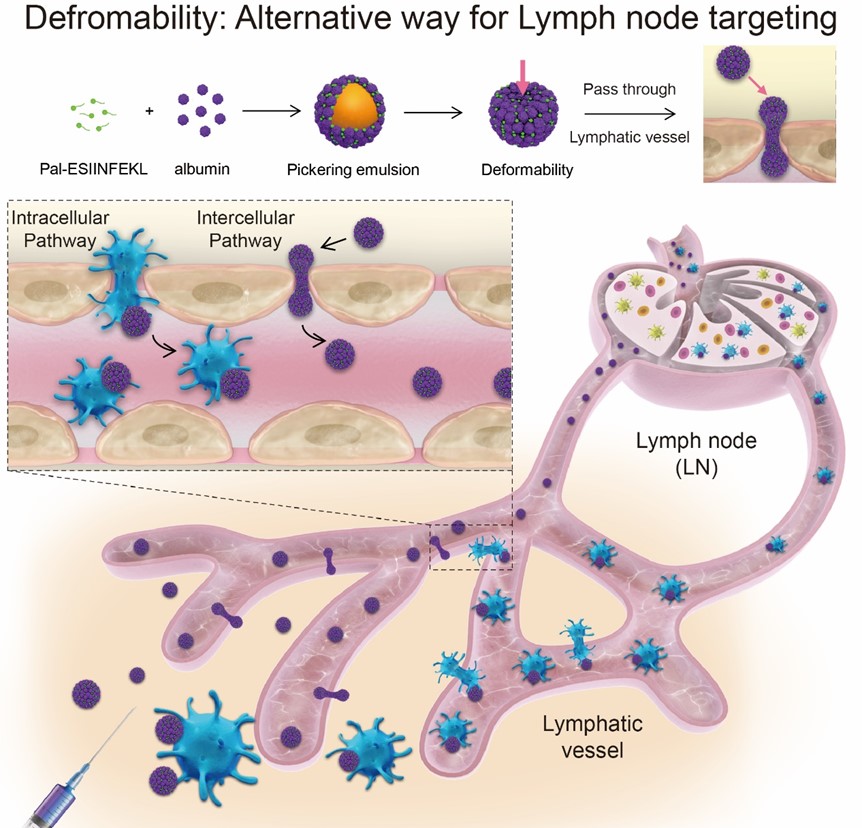Recently, researchers from State Key Laboratory of Biochemical Engineering of the Chinese Academy of Sciences developed a deformable albumin-stabilized emulsions, which significantly improved lymph node delivery efficiency and immune response effect, providing a new strategy for the enrichment of vaccines to lymph nodes.
One of the challenges in vaccine delivery is to achieve lymph-node (LN) accumulation, which can take advantage of concentrated immunocytes and cytokines in LNs to stimulate the onset and persistence of adaptive immune responses. The development of vaccine delivery systems has been focused on the sizes, charges, and surface ligands, but not on their deformability. In fact, the LN homing of antigen-presenting cells depends on deformability to pass through the cellular gaps.
By bio-imitating this, we developed deformable albumin-stabilized emulsions. Due to their mechanical-sensing deformability, droplets (330 nanometers in size) can attach to and deform between cells, allowing them to pass through endothelial spaces (20-100 nanometers) and penetrate lymph nodes. With this biomimetic process, the albumin-stabilized emulsion can be efficiently enriched to the lymph nodes after intramuscular administration. Additionally, some of the emulsion can be retained at administration sites for potent antigen uptake and activation of APCs as well as targeted delivery of vaccines through LNs ", as stated by Prof. Yufei Xia, a coauthor.
Compared with solid particles, the dual LN transfer strategy evidently enhances antigen accumulation and stimulates LN drainage, stimulating cellular immune responses, and improving survival of tumor-bearing mice. In this sense, albumin-stabilized droplets may be used to enhance LN targeting and vaccination-enhancing effects." said Prof. Guanghui Ma, the leader of the research group.
The data have been published online on May 19 in Advanced Materials, entitled “Engineering the Deformability of Albumin-Stabilized Emulsions for Lymph-Node Vaccine Delivery” (DOI: 10.1002/adma.202100106). Ms. Song Tiantian, a jointly trained master student with Beijing Institute of Technology, was the first author of this article. Professor Ma Guanghui, Xia Yufei and Professor Qing Hong were the corresponding authors. Stepping from particulate emulsion techniques, Prof Ma and Prof. Xia group have designed and fabricated a variety of particulate vaccine adjuvants in influenza, enterovirus, SARS-CoV-2 and cancer vaccines, such as lymphoma and melanoma (Chinese Journal of Chemistry 2020, 38, 911. Nat Mater 2018, 17, 187. Adv Mater 2018, 31, 1801067. Adv Mater 2019, 31, 1801159. Adv Mater 2020, 202004210. ACS Nano 2019, 13, 13809).

Figure 1. Albumin-stabilized emulsion deformation enhances lymph node homing (image by IPE)
Media Contact:
LI Xiangyu
Public Information Officer
Institute of Process Engineering, Chinese Academy of Sciences, Beijing 100190, P. R. China.
E-mail: xiangyuli@ipe.ac.cn
Tel: 86-10-82544826
 Search
Search




 京公网安备110402500047号
京公网安备110402500047号